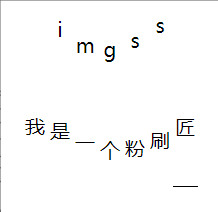жӮЁеҘҪпјҢзҷ»еҪ•еҗҺжүҚиғҪдёӢи®ўеҚ•е“ҰпјҒ
еҰӮдҪ•еҲ©з”ЁVueзј–еҶҷдёҖдёӘ loading жҸ’件пјҹй’ҲеҜ№иҝҷдёӘй—®йўҳпјҢиҝҷзҜҮж–Үз« иҜҰз»Ҷд»Ӣз»ҚдәҶзӣёеҜ№еә”зҡ„еҲҶжһҗе’Ңи§Јзӯ”пјҢеёҢжңӣеҸҜд»Ҙеё®еҠ©жӣҙеӨҡжғіи§ЈеҶіиҝҷдёӘй—®йўҳзҡ„е°ҸдјҷдјҙжүҫеҲ°жӣҙз®ҖеҚ•жҳ“иЎҢзҡ„ж–№жі•гҖӮ
д»Җд№ҲжҳҜvueжҸ’件
var myplugin = {
install:function(Vue, options){
...
}
}д»Һж„Ҹд№үдёҠжқҘиҜҙпјҢжӯЈеҰӮjQueryзҡ„$.fnдҪҝjQueryжңүдәҶдёҖдёӘеәһеӨ§зҡ„з”ҹжҖҒдёҖж ·пјҢVueзҡ„жҸ’件жңәеҲ¶дҪҝVueеҪўжҲҗдәҶдёҖдёӘз”ҹжҖҒзі»з»ҹпјҢдҪ еҸҜд»ҘејҖеҸ‘дёҖдёӘжҸ’件з»ҷеҲ«дәәеӨҚз”ЁгҖӮ
дҪҝз”ЁжҸ’件
дҪҝз”ЁдёҖдёӘжҸ’件пјҢеҸӘиҰҒеғҸдёӢйқўиҝҷж ·:
Vue.use(myPlugin)
еҶҷдёҖдёӘloadingжҸ’件
е…үиҜҙдёҚз»ғеҒҮжҠҠејҸпјҢжҺҘдёӢжқҘеҶҷдёҖдёӘloadingжҸ’件з»ғз»ғжүӢпјҢиҝҷдёӘжҸ’件被е°ҒиЈ…жҲҗдёҖдёӘе…ЁеұҖ组件пјҢе®һзҺ°дёӢйқўзҡ„ж•Ҳжһң:

1 е®ҡд№үжҺҘеҸЈ
жҲ‘们еёҢжңӣеә”з”ЁиҝҷдёӘжҸ’件зҡ„ж–№ејҸеҰӮдёӢ:
<loading text='imgss' duration='3'></loading>
е…¶дёӯпјҢtextз”ЁдәҺе®ҡд№үloadingеҠЁз”»жҳҫзӨәзҡ„ж–Үеӯ—пјҢdurationе®ҡд№үеҠЁз”»ж—¶й—ҙ
2 е®һзҺ°йқҷжҖҒ组件
ж–°е»әдёҖдёӘloading.jsж–Ү件пјҡ
let myPlugin = {
install: function (Vue, options) {
Vue.component('loading', {
props: {
text:{
type:String
},
duration:{
type:String,
default:'1s'//й»ҳи®Ө1s
}
},
data: function() {
return {};
},
template: `
<div class='wrapper'>
<div class='loading'>
<span style='width:20px' v-for='char in text'>{{char}}</span>
</div>
</div>
`
});иҝҷйҮҢжЁЎжқҝзҡ„дҪңз”ЁеңЁдәҺпјҢе°Ҷиҫ“е…Ҙзҡ„еӯ—з¬ҰдёІиҪ¬жҚўжҲҗз»„жҲҗеӯ—з¬ҰдёІзҡ„еӯ—з¬Ұжһ„жҲҗзҡ„spanе…ғзҙ пјӣ
жҺҘдёӢжқҘпјҢж–°е»әдёҖдёӘhtmlж–Ү件пјҡ
<html> <head> <meta charset='utf-8'> <title>жҸ’件</title> </head> <body> <div id="app"> <loading text='imgss'></loading> <loading text='жҲ‘жҳҜдёҖдёӘзІүеҲ·еҢ ' duration='2s'></loading> </div> <script src="http://cdn.bootcss.com/vue/2.4.2/vue.js"></script> <script src="./loading.js"></script> <script> Vue.use(myPlugin); var app = new Vue({ el: '#app', data: { } }); </script> </body> </html>
иҝҷж—¶еҹәжң¬дёҠеҸҜд»ҘзңӢеҲ°дёҖдёӘйқҷжҖҒж•ҲжһңгҖӮ
3 еҠ еҠЁз”»
з»ҷжҜҸдёӘе…ғзҙ еҠ дёҠдёҖдёӘжҺ§еҲ¶дёҠдёӢзҡ„animation
@keyframes move {
0% {
margin-top: -10px;
border-bottom: 1px solid;
}
50% {
margin-top: 10px;
border-bottom: none;
}
100% {
margin-top: -10px;
}
}йҷӨжӯӨд№ӢеӨ–пјҢиҝҳжңүдёҖдёӢе…¶д»–зҡ„е…¬жңүж ·ејҸд»Јз ҒпјҢеҲ©з”Ёmountedз”ҹе‘Ҫе‘ЁжңҹеҮҪж•°пјҢеҠЁжҖҒз”ҹжҲҗдёҖдёӘstyleж ҮзӯҫпјҢе°Ҷcssд»Јз ҒжҸ’еҲ°ж–ҮжЎЈдёӯ:
mounted: function () {
var cssFlag = false;
return function () {
if (cssFlag) {
return;
}
var head = document.querySelector('head');
var style = document.createElement('style');
style.type = 'text/css';
style.innerText = `
.wrapper{
display: flex;
justify-content: center;
}
.loading {
display: flex;
text-align: center;
padding-top: 30px;
height: 50px;
justify-content: space-between;
}
.loading span {
margin-top: 0;
animation: ease infinite move;
display: block;
}
@keyframes move {
0% {
margin-top: -10px;
border-bottom: 1px solid;
}
50% {
margin-top: 10px;
border-bottom: none;
}
100% {
margin-top: -10px;
}
}`;
head.appendChild(style);
cssFlag = true;
};
}(),然еҗҺйҖҡиҝҮжҺ§еҲ¶spanзҡ„animation-delayжқҘжЁЎжӢҹжӣІзәҝ:
<span
:style='{
width: "20px",
animationDuration: duration.indexOf("s") === -1 ? duration + "s" : duration ,
animationDelay: parseInt(duration)/text.length*index +"s"
}'
v-for='char,index in text'>
{{char}}
</span>еҲ°иҝҷйҮҢпјҢжҸ’件еҹәжң¬е®ҢжҲҗ,зңӢдёҖдёӢж•Ҳжһң:

е…ідәҺеҰӮдҪ•еҲ©з”ЁVueзј–еҶҷдёҖдёӘ loading жҸ’件问йўҳзҡ„и§Јзӯ”е°ұеҲҶдә«еҲ°иҝҷйҮҢдәҶпјҢеёҢжңӣд»ҘдёҠеҶ…е®№еҸҜд»ҘеҜ№еӨ§е®¶жңүдёҖе®ҡзҡ„её®еҠ©пјҢеҰӮжһңдҪ иҝҳжңүеҫҲеӨҡз–‘жғ‘жІЎжңүи§ЈејҖпјҢеҸҜд»Ҙе…іжіЁдәҝйҖҹдә‘иЎҢдёҡиө„и®Ҝйў‘йҒ“дәҶи§ЈжӣҙеӨҡзӣёе…ізҹҘиҜҶгҖӮ
е…ҚиҙЈеЈ°жҳҺпјҡжң¬з«ҷеҸ‘еёғзҡ„еҶ…е®№пјҲеӣҫзүҮгҖҒи§Ҷйў‘е’Ңж–Үеӯ—пјүд»ҘеҺҹеҲӣгҖҒиҪ¬иҪҪе’ҢеҲҶдә«дёәдё»пјҢж–Үз« и§ӮзӮ№дёҚд»ЈиЎЁжң¬зҪ‘з«ҷз«ӢеңәпјҢеҰӮжһңж¶үеҸҠдҫөжқғиҜ·иҒ”зі»з«ҷй•ҝйӮ®з®ұпјҡis@yisu.comиҝӣиЎҢдёҫжҠҘпјҢ并жҸҗдҫӣзӣёе…іиҜҒжҚ®пјҢдёҖз»ҸжҹҘе®һпјҢе°Ҷз«ӢеҲ»еҲ йҷӨж¶үе«ҢдҫөжқғеҶ…е®№гҖӮ
жӮЁеҘҪпјҢзҷ»еҪ•еҗҺжүҚиғҪдёӢи®ўеҚ•е“ҰпјҒ